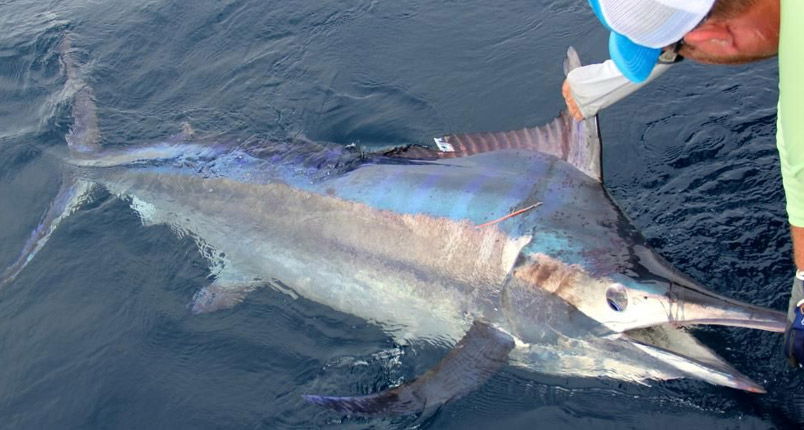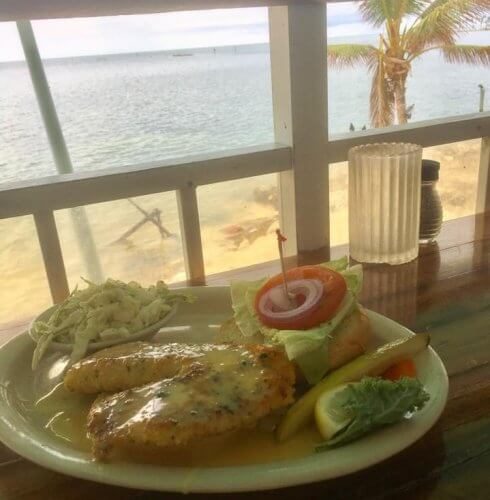Gulf of Mexico Blue Marlin Tournament Data Analysis

What is the right minimum size for blue marlin in the Gulf Tournaments? The Billfish Foundation newest Winthrop P. Rockefeller Ocean Program intern Nick Becker, a recent graduate from Duke University’s Nicholas School of the Environment, is working on assessing blue marlin tournaments minimum sizes on harvested blue marlin – a continuation from his master’s […]
Florida’s Saltwater Industry Back In Business After Irma

Following the wrath of Hurricane Irma came the destruction: downed trees, debris thrown across roadways, docks uplifted from their posts, boats sunken or tossed on land, and in some cases complete flattening of structures. The entire state of Florida felt the massive storm and its aftermath in some way, not least of all the recreational and saltwater industry. Tourism is a strong economic generator for the state, but took a beating during the hurricane. Entertainment parks like Disney World and Miami Seaquarium, water activities like charter fishing and craft rentals, and entire destinations like Key West all shut down
ATLANTIC BLUEFIN TUNA GENERAL FISHERY OPEN 4 DAYS BEFORE ANOTHER CLOSURE
The Atlantic bluefin tuna General category fishery for large-medium and giant bluefin tuna closes Thursday October 5, 2017 for roughly two months. This comes just four days after the October 1 reopening of a previous closure instituted on September 17. The National Marine Fisheries Service made the decision to close the fishery based on the best available landings information in addition to current catch rates and fishing conditions. NMFS determined that the September subquota for the General category will be reached by October 5, warranting a closure. This closure applies to vessels permitted in the commercial Atlantic tunas General category as
TUNAS & FLOATING OBJECTS DOMINATE CONVERSATION AT ICCAT
The International Commission for the Conservation of Atlantic Tunas (and other highly migratory species, HMS) convened mid-September in Madrid, Spain specifically to discuss management of tropical tunas followed by the topic of fish aggregation devices (FADs). The first gathering regarding tropical tunas was largely made up of scientists, with heavy representation from Spain, France, and the U.S., as well as with individuals from Japan, Ivory Coast, the International Seafood Sustainability Foundation, and more. The purse seine fishery is of primary concern when it comes to tropical tunas, as most are caught in this type of gear. Further, purse seine
NOVA HALTS LONGLINE RESEARCH
TBF thanks its constituents for their continued support in keeping this issue at the forefront. Join the TBF community today to be part of our efforts on matters like
Celebrating the Miami Seaquarium’s Birthday With A Beach Cleanup

Bags of trash collected during Miami Seaquarium’s beach cleanup to commemorate their 62nd anniversary The Billfish Foundation strives to support its local south Florida community and partners with like-minded organizations to expand our work. In keeping with this practice, TBF helped the Miami Seaquarium celebrate its 62nd birthday this past Sunday, September 24. To commemorate its 62nd anniversary, MSQ invited the community to a beach cleanup at the Historic Virginia Key Beach Park, across the street from the Seaquarium. In addition to the recent damage from Hurricane Irma, the Park is a popular spot for locals and that heavy use can
RECOMMENDATIONS FOR ATLANTIC SWORDFISH VARY BY STOCK
Highly migratory species, including tunas and billfish, travel the world’s oceans and traverse national boundaries. Regional fishery management organizations (RFMOs) work at the international level to manage such species, bringing together scientists and policymakers from all nations who have a stake in the fishery. The International Commission for the Conservation of Atlantic Tuna (ICCAT) is the RFMO that manages tuna, billfish, and sharks in the Atlantic Ocean. Management and catch limit recommendations are made each year based on the best available science. However, assessing the health of each species requires a substantial amount of data and cannot be accomplished
Atlantic Bluefin Tuna Fishery Closes For September
The Atlantic bluefin tuna General category fishery for large-medium and giant bluefin tuna (73 in. curved fork length or larger) closes September 17, 2017 for the remainder of the month. The National Marine Fisheries Service instituted the closure, effective 11:30 p.m. local time Sunday night, until the reopening on October 1, 2017. It was determined that the subquota for September will have been reached by Sept. 17, and therefore the closure is warranted. The closure, which affects vessels permitted in the commercial Atlantic tunas General category as well as the HMS Charter/Headboat category, is intended to prevent overharvest
TBF Takes Aim At Nova’s Longline Research In Closed Zone
Nova Southeastern University’s longline research in Florida’s east coast closed zone may damage its reputation for community relations and science. An associate professor from the university was granted an exempted fishing permit to begin longline research in August. The Billfish Foundation maintains that allowing longlines in the zone will threaten sportfishing opportunities and the species that support the industry. See the letter TBF sent to the university President below. Become a member of TBF today and sign up for our newsletter to stay up to date on news like this. Donate to support our fight for this and other
NMFS Introduces Online Reporting System For Fishing Tournaments
An online reporting system will now be available for highly migratory species (HMS) fishing tournaments in the Atlantic Ocean, the National Marine Fisheries Service announced this week. HMS tournament operators are required to register with NMFS whether targeting sharks, tunas, billfish, or swordfish. The tournaments must also keep records of anglers and the results, and may be required to send a catch report at the end of the event. All billfish tournaments are required to send the catch report. Reporting is important for the management of the involved species as it helps to characterize a portion of the recreational




